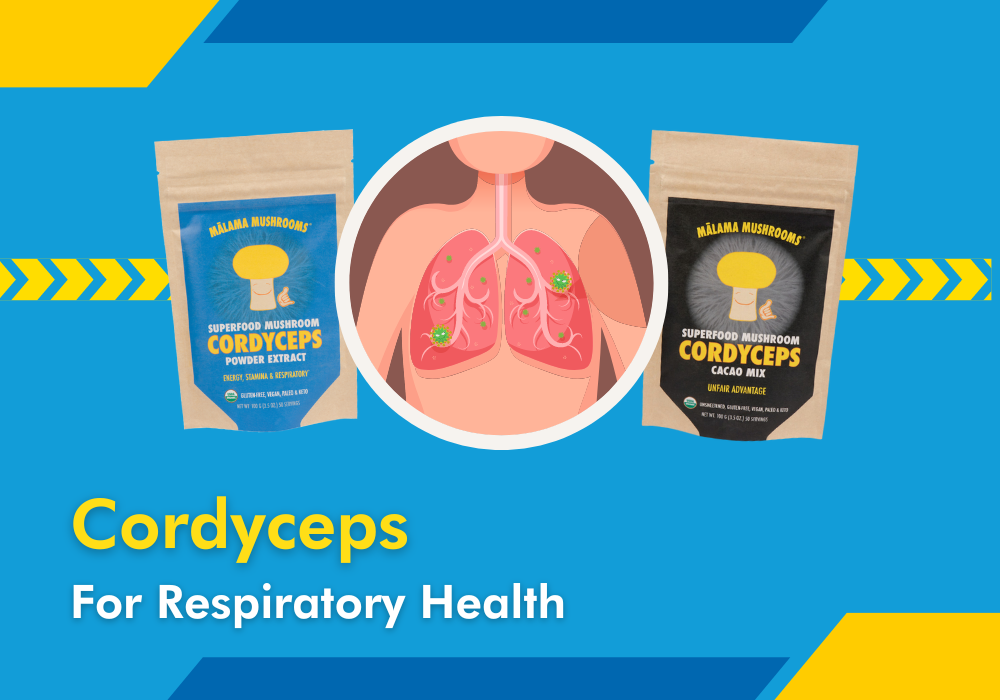
Cordyceps Militaris for Respiratory Health: How it Can Help with Asthma and Bronchitis
Share

Respiratory health is critical to take care of as it directly impacts our overall well-being. Unfortunately, common conditions such as asthma and bronchitis can significantly lower the quality of life for those affected. Emerging research on Cordyceps militaris, a type of medicinal mushroom, proves its therapeutic properties for improving respiratory function. Ancient medicine systems like those of China, Tibet and Bhutan used this mushroom for respiratory health and preventing altitude sickness. Today in modern society we are also catching on to the amazing health benefits of this mushroom.
Understanding Respiratory Health and Common Conditions:
The respiratory system includes the lungs, bronchi, trachea, and nasal passages. Its primary function is oxygen and carbon dioxide exchange. Conditions like asthma and bronchitis can impair this crucial process.
Asthma is a chronic respiratory condition characterized by recurring episodes of wheezing, coughing, shortness of breath, and chest tightness. It is caused by inflammation and narrowing of the airways, often triggered by allergens, exercise, or environmental factors.
Bronchitis, on the other hand, refers to the inflammation of the bronchial tubes. Acute bronchitis is typically caused by viral infections and presents symptoms such as coughing, phlegm production, and fatigue. Chronic bronchitis, often associated with smoking, is a long-term condition that leads to persistent coughing and impaired lung function.
The Potential of Cordyceps militaris in Improving Respiratory Function

Cordyceps militaris, commonly referred to as just ‘cordyceps’, is a fungus native to high-altitude regions around the world. It has gained attention for its potential in enhancing respiratory health. Traditional Chinese medicine has utilized a similar species of cordyceps due to its ability to support lung and kidney function, increase energy levels, and improve overall vitality. Because Cordyceps militaris is able to be commercially cultivated, this species is more sustainable to utilize while having the same benefits of the cordyceps used in Chinese medicine.
The bioactive compounds found in Cordyceps are polysaccharides, cordycepin, adenosine, and ergosterol. These compounds exhibit anti-inflammatory, immunomodulatory, and antioxidant properties, which positively impact respiratory health.
How Cordyceps militaris Works to Help with Asthma and Bronchitis
Cordyceps is effective in treating asthma and bronchitis through various mechanisms. First, its anti-inflammatory properties help reduce airway inflammation, preventing the narrowing of the airways characteristic of asthma. Second, it acts as an immunomodulator, regulating the immune response and mitigating excessive immune reactions that contribute to asthma and bronchitis symptoms. Additionally, cordyceps demonstrates antioxidant activity, which can protect against oxidative stress-induced damage in the respiratory system. This makes cordyceps also beneficial for people who do aerobic sports like running or cycling.
Clinical Studies and Research on the Effects of Cordyceps
Several clinical studies have explored the effects of cordyceps on respiratory health. For instance, a study published in the Journal of Traditional and Complementary Medicine investigated the impact of cordyceps on exercise-induced bronchoconstriction (EIB) in asthmatic individuals. The results showed a significant reduction in EIB symptoms and improved lung function after supplementation with cordyceps.
Another study published in the Journal of Medicinal Food examined the effects of cordyceps on patients with chronic obstructive pulmonary disease (COPD), a condition often associated with chronic bronchitis. The researchers found that cordyceps supplementation led to improvements in lung function, exercise tolerance, and overall quality of life in COPD patients.
Furthermore, a review article published in the International Journal of Medicinal Mushrooms summarized various studies on cordyceps species and their effects on respiratory health. The authors concluded that cordyceps has promise as an adjunctive therapy for asthma and other respiratory conditions, based on its anti-inflammatory, immunomodulatory, and antioxidant properties.
Tips for Incorporating Cordyceps militaris into Your Wellness Routine for Respiratory Health:

If you're considering incorporating cordyceps into your wellness routine to support respiratory health, here are some tips to keep in mind:
- Quality and Source: Choose a brand that provides high-quality cordyceps derived from 100% fruiting body and is third-party lab tested like Mālama Mushrooms. Being derived from mushroom fruiting body ensures that there is no filler in your product. Third-party testing ensures that the results aren’t swayed towards the manufacturer.
- Form of Consumption: Cordyceps is available in various forms, including capsules, powders, and tinctures. Select a form that suits your preference and lifestyle. Powders can be added to smoothies, coffee, or other beverages. Tinctures are great if you don’t want to incorporate it into food or beverage.
- Dosage and Consultation: Follow the recommended dosage instructions provided by the manufacturer. If you have any underlying health conditions or are taking medications, it's advisable to consult with a healthcare professional before starting any new supplement.
Combining Cordyceps with Other Natural Remedies for Enhanced Benefits
While cordyceps shows promise on its own, combining it with other natural remedies may enhance its benefits for respiratory health. For instance, incorporating practices like deep breathing exercises, yoga, and regular physical activity can improve lung function and overall respiratory wellness. Additionally, herbal remedies such as ginger, licorice root, and turmeric have been traditionally used to support respiratory health and can complement the effects of cordyceps.
Safety precautions and potential interactions to be aware of
Cordyceps is generally considered safe for most individuals when taken as recommended. However, it's essential to be aware of potential interactions with medications, especially immunosuppressants and anticoagulants. If you're taking any prescription medications, it's crucial to consult with your healthcare provider before starting Cordyceps militaris supplementation to ensure there are no contraindications or adverse interactions.
Conclusion and recommendations for using cordyceps to support respiratory health
Cordyceps holds great promise in improving respiratory health, particularly in the context of asthma and bronchitis. Its anti-inflammatory, immunomodulatory, and antioxidant properties contribute to its therapeutic effects. Clinical studies have demonstrated its positive impact on lung function, exercise tolerance, and overall quality of life in individuals with asthma and chronic bronchitis.
If you're interested in incorporating cordyceps into your wellness routine, ensure you choose a high-quality product from a reputable source like Mālama Mushrooms. You can use code MALAMABLOG for 15% off your cordyceps order. Even if you don’t suffer from a respiratory disorder, cordyceps has incredible benefits in improving your energy, focus and overall performance.
